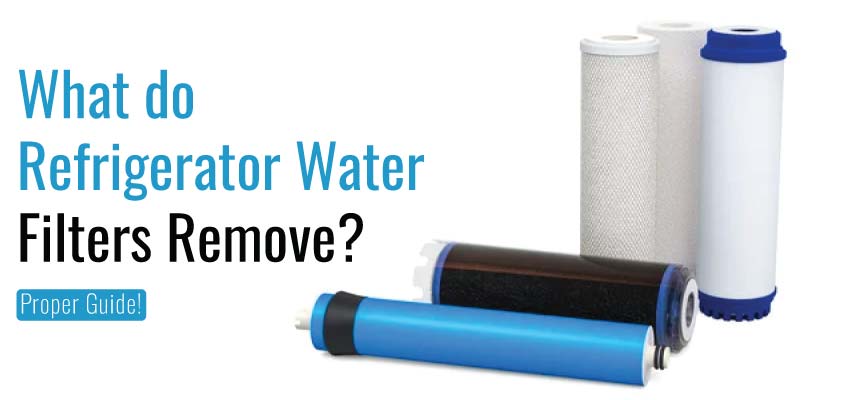For many households, having access to fresh, clean water is critical. Nothing beats a long glass of cool, pure water after a hard afternoon of yard labour or a strenuous workout.

If you own a home with a water filtration system, you are well aware of the need of eliminating contaminants from the water.
However, you might be wondering if, in addition to your whole-house filtration system, refrigerator water filters remove sodium.
For quick access to cool, clean drinking water, many people prefer to install a refrigerator with a water dispenser.
Learn more about how refrigerator water filters operate and how a water filtration system may provide great-tasting water. And also, learn whether refrigerator water filters remove sodium.
Do Refrigerator Water Filters Remove Sodium?
Refrigerator water filters do not remove heavy metals and salt unless your refrigerator expressly identifies them. Distillation and certain reverse osmosis systems are two methods for successfully removing salt from domestic drinking water.
A deionizer’s hydrogen form cation exchanger can be used to remove sodium. Reverse osmosis lowers salt levels by 94-98%. Sodium is also removed during distillation.
When it comes to removing salt from your drinking water, you have a few alternatives. Water is filtered by a semi-permeable membrane in reverse osmosis systems. It can remove both organic and inorganic contaminants. Salts do not form part of the steam because they are chemically heavier than water.
Lead, chlorine, and volatile organic compounds are the three types of pollutants that most refrigerator filters are designed to eliminate. In addition, some have been certified to remove cysts and chloramine.
Which Refrigerator’s Water Filters Remove Sodium?
Physical filtration is the most frequent and successful method for removing salt from water. Reverse osmosis systems, in particular, are capable of eliminating salt and a range of other impurities from softened water.
Reverse osmosis, electrodialysis, distillation methods, or ion exchange can all be used to remove salt from water. However, when it comes to energy and money, a reverse osmosis filter is the most cost-effective option.
What is the Best inline Water Softener for a Refrigerator?
Inline water filters are inexpensive and effective at removing chlorine taste and odour, sediments, and other impurities from water.
These are the top inline water filter for you whether you use municipally treated water or well water.
GE MWF Refrigerator Water Filter:
The NSF-certified MWF replacement refrigerator water filter from GE is an enhanced version of the GWF model, offering you and your family cleaner, healthier, and better-tasting drinking water at home. It’s part of the company’s SmartWater filtration line. The MWF is a safe and economical approach to contribute to a healthy lifestyle by lowering toxins such as mercury, toxaphene, p-dichlorobenzene, carbofuran, alachlor, benzene, lead, cryptosporidium, and giardia.
Everydrop by Whirlpool Ice and Water Refrigerator Filter 1
Everydrop filters are certified to remove 99% of lead and other potentially hazardous impurities, providing you and your family with easy, filtered water. Replace your Everydrop filter every 6 months for the purest water (or 200 gallons).
Samsung Electronics HAFCIN Water Filter
Genuine SAMSUNG Refrigerator Water Filters provide clean, fresh water to your family while also safeguarding your refrigerator and house from damage. A strong concentrated carbon filter is used in this filter to remove over 99% of potentially dangerous pollutants. Both Korea and Mexico make Samsung Genuine filters.
Are Refrigerator Water Filters Worth it?
Yes absolutely. Refrigerator water filters are a must-have, and they must be changed regularly. Before it reaches you, the water from your refrigerator dispenser travels a long distance through the tubing.
The quality of tap water is already suspect, let alone the germs and bugs it may pick up on its route to your refrigerator.
Fortunately, your refrigerator’s water filter takes care of this. Unless you never replace it, of course. The owner’s handbook for your refrigerator will inform you how often to replace the water filter. It’s usually every three to six months to give you a heads up.
Carbon filtration is used in almost every refrigerator on the market with a water dispenser. To capture impurities in your water, activated charcoal is utilized as a filter in carbon filtration.
This procedure is quite good in removing chlorine from water, widespread in municipal water systems. If your water has too much chlorine, it may smell and taste like a swimming pool.
On the other hand, Refrigerator water filters cannot collect all impurities. Therefore, heavy metals can be partially removed, but carbon filtering will not remove them completely.
On the other hand, carbon filtration will not filter any dissolved particles since they will flow through the activated charcoal.
To begin with, most people are unaware of what is in their tap water. They believe it is safe to drink because it passes through a water treatment facility. This isn’t always the case, however. Replacing your fridge water filter on a regular basis gives another layer of defence against hazardous chemicals and germs for you and your family.
Do I Need a Separate Water Filter for Refrigerator?
The light in the fridge is flashing again, indicating that the filter needs to be replaced. But, since the water it produces tastes excellent, is it really essential to replace the filter?
Varied water filters have different life spans, so read the documentation that came with yours to see how frequently you need to replace it – generally depends on time or the volume of water you’ve filtered.
Most refrigerator filters cannot remove toxins such as arsenic, fluoride, nitrate and nitrite, barium, and radium if you want to eliminate as many as possible.
Because refrigerator filters only employ a carbon filter, which has limits in pollutant removal.
So, if you want to remove the most contaminants, you’ll need a carbon filter with a reverse osmosis filter or a carbon filter with another medium. Although many carbon filters are extremely efficient, the types of pollutants these filters may remove are limited.
A basic refrigerator filter could suffice if you’re not concerned about the toxins listed above. However, we recommend purchasing filters that third-party labs have tested to ensure that they can remove the contaminants.
According to Fresh Water Systems, if your refrigerator filter isn’t changed, all of the impurities accumulated so far will flow over and end up back in the water. And you may become ill as a result of this.
Conclusion:
Refrigerator water filters perform well when properly maintained and updated regularly. Here’s what we recommend: Replace your water filter as directed in the owner’s handbook for your appliance, which is usually once every six months. This ensures that your water is pure, clear, healthful, and delicious.



